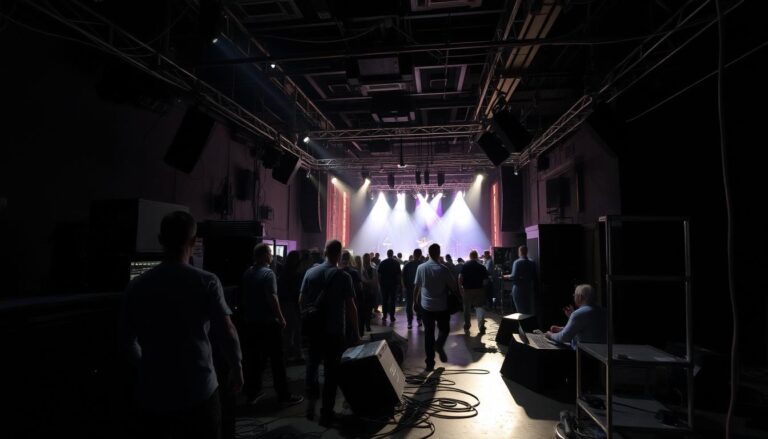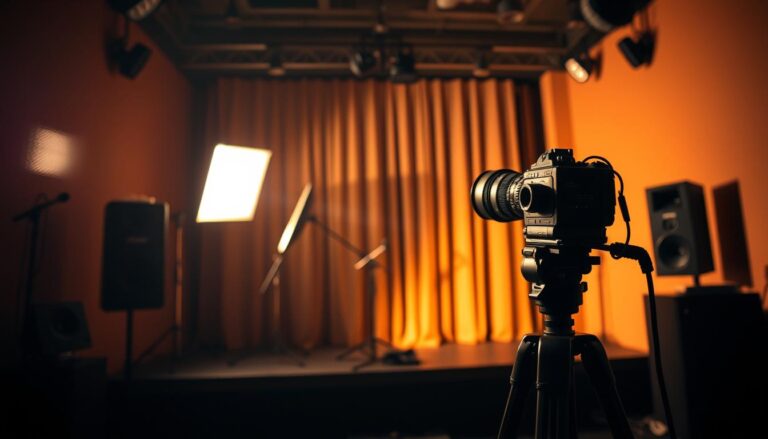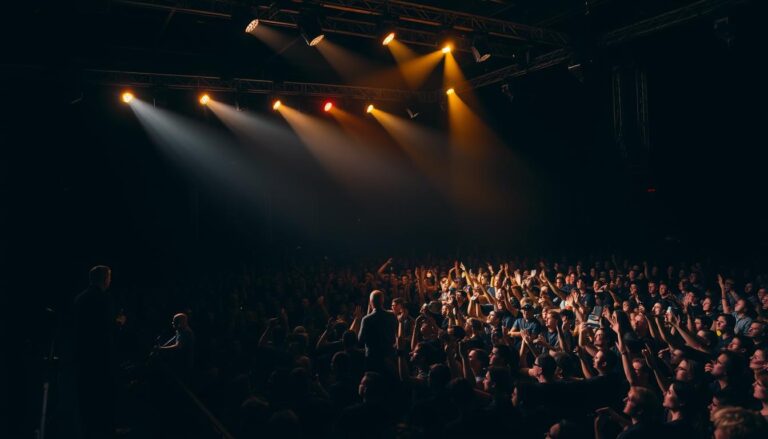Attending a live concert can be an exhilarating experience, but to truly appreciate the music, it’s essential to understand the importance of a soundcheck. According to dBs Institute, live music experiences can be life-changing and era-defining. A soundcheck ensures the sound system is working correctly, and the performers can hear themselves, while the audience can enjoy the music.
To make the most of your live music experience, arriving at the right time and knowing what to listen for during the soundcheck can enhance your overall enjoyment. Live sound engineers play a crucial role in ensuring a successful live music experience.
Key Takeaways
- Understand the importance of a soundcheck for a better live music experience.
- Arrive early to catch the soundcheck and get familiar with the venue.
- Listen for sound quality and balance during the soundcheck.
- Appreciate the role of live sound engineers in delivering a great concert.
- Enhance your overall concert experience by being informed.
Understanding the Purpose of a Soundcheck
A soundcheck is more than just a technical necessity; it’s an opportunity for both the artists and the audience to preview the quality of the live performance. During this process, sound engineers test the sound system to ensure that it is working correctly, checking microphones, instruments, and monitors to guarantee a high-quality audio experience for everyone involved.
What Happens During a Soundcheck
During a soundcheck, the sound engineers meticulously test each component of the sound system. This includes checking for any technical issues with the microphones, instruments, and monitors. For instance, they might test the vocal levels and effects to ensure clarity and balance. As explained in a guide on live sound engineers, their role is crucial in ensuring that the sound system is optimized for the performance.

Why Soundchecks Matter for the Live Experience
A soundcheck is not just about technical aspects; it’s also about creating an enjoyable experience for the audience. A good soundcheck can significantly enhance the overall concert experience, making it more enjoyable for the punters. It ensures that the audience can fully appreciate the music without any distractions caused by poor sound quality.
Technical Aspects vs. Audience Experience
While the technical aspects of a soundcheck are crucial, the ultimate goal is to provide an exceptional experience for the audience. A well-conducted soundcheck balances these technical aspects with the needs of the audience, ensuring that the live event is both enjoyable and memorable.
| Aspect | Technical Focus | Audience Experience |
|---|---|---|
| Sound Quality | Ensuring clarity and balance | Enjoying the music without distractions |
| Instrument Balance | Adjusting levels for optimal mix | Appreciating the nuances of the performance |
The Insider’s Guide to Soundcheck Tips for Punters
As a punter, being aware of what happens during a soundcheck can significantly enhance your appreciation of the live performance. A good soundcheck is the backbone of a great concert, ensuring that the sound is balanced and clear for the audience.

Recognising a Good vs. Poor Soundcheck
A good soundcheck results in a balanced and clear sound, while a poor soundcheck can lead to a subpar listening experience. According to experts, a well-conducted soundcheck makes a significant difference in the overall concert experience. Distortion, imbalance, and unclear vocals are signs of a poor soundcheck.
How Soundchecks Affect Your Concert Experience
The quality of the soundcheck directly impacts your concert experience. A well-balanced soundcheck ensures that every instrument and vocal is clear and enjoyable. As noted by sound engineers, “A good soundcheck is like a good foundation for a building; it holds everything together.”
“The soundcheck is where the magic happens, setting the tone for an unforgettable night.”
Red Flags to Watch For
- Distortion in vocals or instruments
- Imbalance in sound levels
- Unclear or muffled audio
By being aware of these red flags, you can better appreciate the efforts of the sound engineers and enjoy the concert to its fullest.
When to Arrive for Optimal Soundcheck Benefits
For the ultimate pre-show experience, timing is everything. Arriving early to a concert can provide several benefits, including the opportunity to experience the soundcheck. The timing of your arrival can depend on the venue and the type of event.
Early Bird Advantages
Getting to the venue early can give you a unique perspective on the concert preparations. You’ll have the chance to see the soundcheck up close, which can be an exciting experience. Some of the advantages include:
- Witnessing the technical aspects of the concert preparation
- Experiencing the soundcheck firsthand
- Possibly interacting with the artists or crew
Venue-Specific Timing Considerations
Different venues have different soundcheck schedules. Larger venues like stadiums and outdoor amphitheaters may start soundchecks earlier in the day, while smaller clubs might begin later. It’s essential to check with the venue for specific timing.
Australian Festival vs. Club Gig Differences
Festivals and club gigs have different dynamics. Festivals often have multiple stages with soundchecks happening simultaneously, while club gigs are typically more straightforward. Understanding these differences can help you plan your arrival time. For instance, at Australian festivals like Splendour in the Grass, soundchecks can start hours before the gates open.
What to Listen For During a Soundcheck
When attending a live concert, understanding what to listen for during a soundcheck can significantly enhance your overall experience. During this critical pre-show process, sound engineers fine-tune the audio to ensure that the performance sounds its best. By knowing what to listen for, you can appreciate the efforts that go into creating an exceptional pre-show experience.
Instrument Balance and Clarity
One of the key aspects to listen for during a soundcheck is the balance and clarity of the instruments. A well-balanced sound ensures that no single instrument overpowers the others, creating a harmonious blend that enhances the overall concert listening guide experience. Pay attention to how the different frequencies are managed; a good soundcheck should result in clear, crisp sounds across the spectrum.
Vocal Levels and Effects
Vocal levels and effects are another crucial element to focus on. The sound engineers will adjust the vocal levels to ensure they are clear and prominent in the mix. Listen for how effects such as reverb or delay are used to enhance the vocal performance without overpowering the instruments. This balance is key to a great live sound.
Room Acoustics and Sound Distribution
The acoustics of the venue play a significant role in how the sound is distributed throughout the space. During a soundcheck, listen for how the sound engineers adjust the sound system to compensate for the venue’s acoustics. This might involve tweaking the equalization or adjusting the placement of speakers to ensure that the sound is evenly distributed across the audience area.
Genre-Specific Considerations
Different genres of music have unique sound requirements. For example, a rock concert might emphasize powerful bass and clear vocals, while a jazz performance might focus on nuanced instrumental tones. Understanding these genre-specific considerations can help you appreciate the soundcheck process even more, as you listen for the specific audio elements that are being optimized for the performance.
Finding the Sweet Spot: Positioning Yourself for the Best Sound
The sound quality at a live music event can vary greatly depending on where you’re standing or sitting. Being aware of this can help you position yourself for the best possible listening experience. Experts agree that being in the right position can make a significant difference in how you enjoy the concert.
Front-of-House vs. Other Locations
The front-of-house (FOH) area is typically considered the best spot for optimal sound quality. This is because the sound engineer’s mixing desk is usually located here, ensuring that the sound is balanced and clear. However, other locations within the venue can also offer great sound, depending on the venue’s acoustics and the positioning of the speakers.
Avoiding Sound Dead Zones in Australian Venues
Some areas within a venue can be considered “sound dead zones” due to poor sound quality. These areas can result from the venue’s architecture or the placement of sound equipment. Being aware of these zones can help you avoid them and find a better spot. Australian venues, with their diverse architectures, can sometimes present unique challenges in terms of sound distribution.
Acoustic Quirks of Popular Aussie Music Venues
Different venues have their own acoustic characteristics. For instance, outdoor amphitheaters might have a different sound profile compared to indoor clubs. Understanding these quirks can help you make informed decisions about where to position yourself. Here’s a comparison of some popular Australian venues and their acoustic characteristics:
| Venue | Location | Acoustic Characteristics |
|---|---|---|
| Sydney Opera House | Sydney | Excellent reverberation and clarity |
| Melbourne Recital Centre | Melbourne | Renowned for its precise sound reflection |
| Red Hill Auditorium | Brisbane | Offers a unique outdoor listening experience with minimal echo |
By understanding the acoustic quirks of your chosen venue and positioning yourself accordingly, you can significantly enhance your concert experience. Whether you’re a seasoned concert-goer or just looking for a great spot at your next gig, being mindful of these factors can make all the difference.
Etiquette and Insider Tips for Soundcheck Attendees
Understanding the etiquette of soundcheck attendance is crucial for a positive pre-show experience. When attending a soundcheck, it’s essential to be respectful of the process and the crew working hard to ensure a great show.
Respecting the Process: The Australian Way
Australians are known for their friendly nature, and this extends to how they conduct themselves during a soundcheck. Being mindful of the crew’s work and following their instructions is paramount. This includes staying out of restricted areas and not touching any equipment.
- Be aware of your surroundings and keep a safe distance from the crew.
- Avoid taking flash photography, as it can be distracting.
- Keep your voice down to avoid interfering with the soundcheck.
Interacting with Crew and Artists
Interacting with the crew and artists can be a highlight of attending a soundcheck. Being respectful and considerate in your interactions can make a positive impression. If you’re lucky enough to meet the artists, a polite and friendly demeanor goes a long way.
Tips for interacting with crew and artists:
- Be courteous and respectful in your approach.
- Keep your questions brief and relevant.
- Show appreciation for their work and time.
Making the Most of Pre-Show Opportunities
To enhance your concert listening guide experience, take advantage of the pre-show opportunities. This might include listening to the soundcheck from different parts of the venue to understand the sound distribution.
Special Considerations for Regional Gigs
Regional gigs often have unique characteristics, such as different venue acoustics. Being aware of these differences can help you make the most of your soundcheck experience. Take note of how the sound varies across the venue and position yourself accordingly.
Enhancing Your Live Music Experience Through Soundcheck Awareness
By being aware of the soundcheck process and taking advantage of the opportunities it provides, concert-goers can significantly enhance their live music experience. Following the soundcheck tips for punters outlined in this article, you can gain a deeper appreciation for the live music experience and make the most of your time at the concert.
Understanding what to listen for during a soundcheck and when to arrive can greatly impact your concert listening guide. By positioning yourself in the best location and being mindful of the pre-show experience, you can enjoy a more immersive and engaging live music experience.
As you attend more concerts and festivals in Australia, applying these soundcheck tips will help you navigate the pre-show experience with confidence, allowing you to focus on enjoying the music and the atmosphere.





